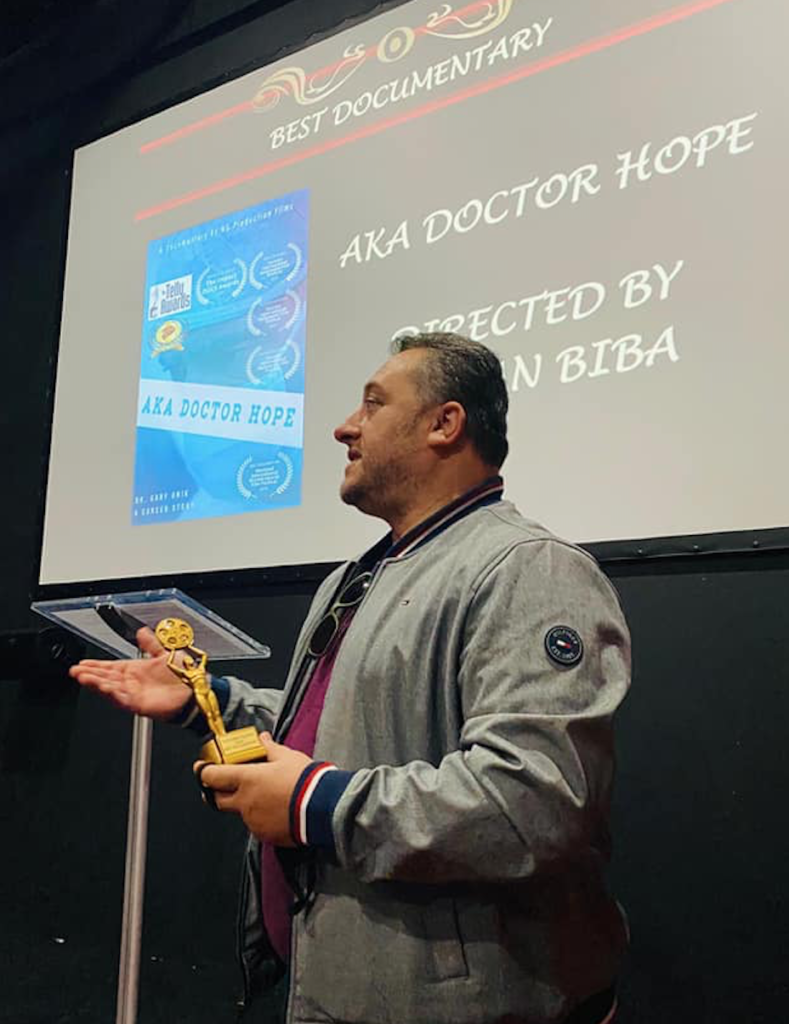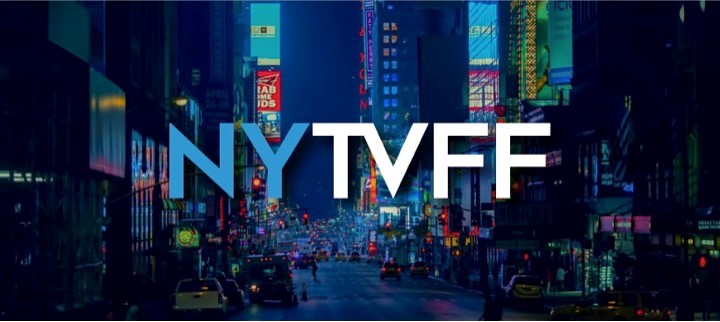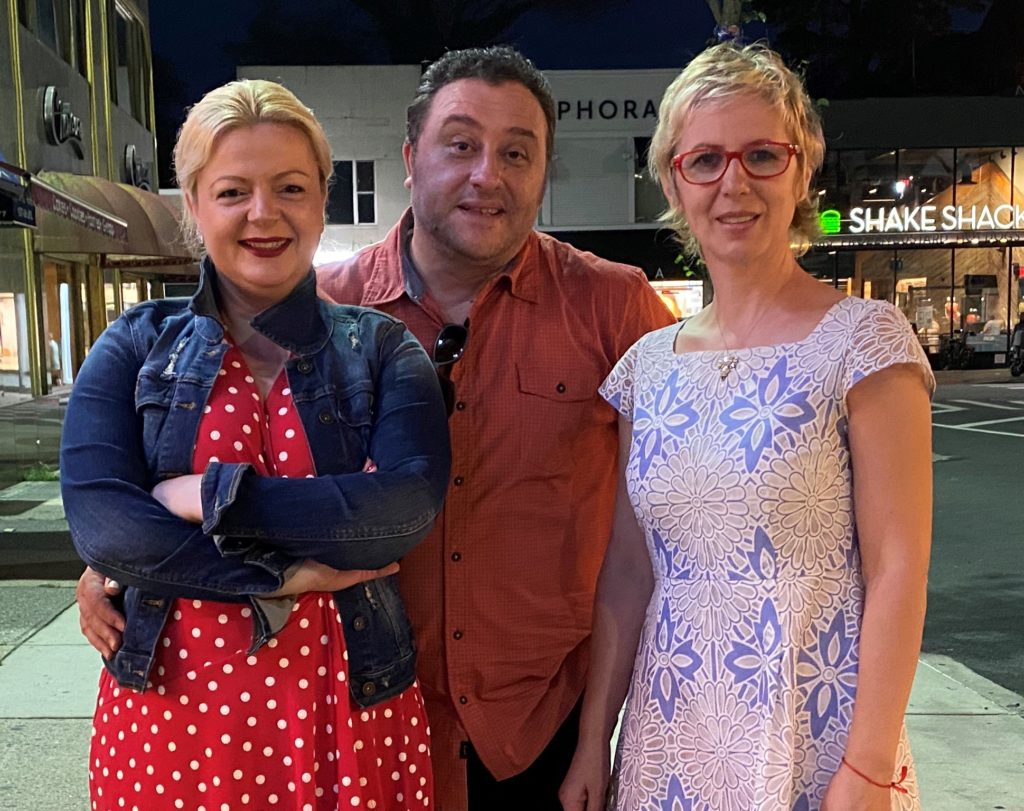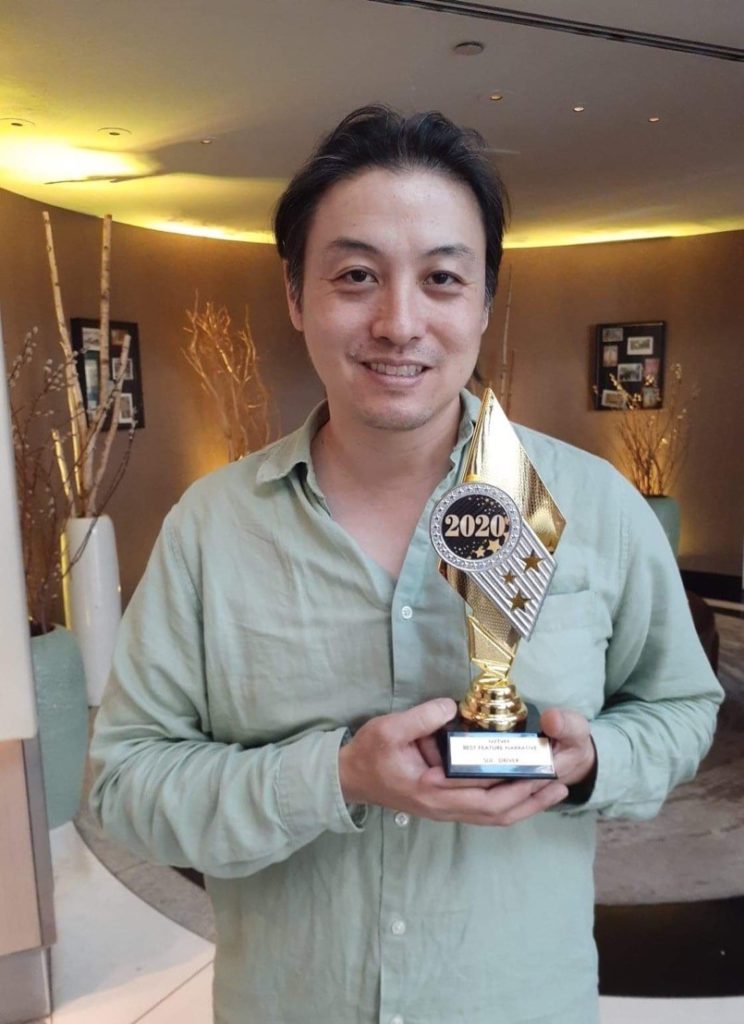
By Nora Kalaja/



Julian Biba is the director of the documentary “Aka Dr. Hope” awarded: “Best Experimental”, “Best Documentary” and “Best Director” by TINFF; “Best Documentary” by MIWAFF and “Silver Winner” by Telly Awards.
He is the screenwriter, director and producer of “The Red Rose” awarded: “Rising Filmmaker” by Montreal International Wreath Awards Film Festival; “Award of Recognition” by United International Film Festival and “Best NY Short” by International New York Film Festival.
Julian has co-written and co-produced the film “Paftuar” (Uninvited) that was screened on May 2016 at Cannes Festival Short Corner and also won “Best Cinematography” and “Best Production” awards at International Film Festival and Albanian Film Week in NYC.
Julian’s feature script “The Bright Future” was picked as 10 best scripts at the AlbaScript workshop organized in Pogradec, Albania by Cineuropa and Albanian National Cinematography Center.
Julian’s other feature script “Leap of Faith” was quarter-finalist at National Screenwriters Day Screenwriting Competition and 2018 Gold Reel Award Winners in Nevada Film Festival.
His short comedy script “Balkan Brothers” was the Official Selection of Oaxaca FilmFest 2017 while in March 2016 Julian Directed and Produced a music video for an Italian pop singer.
Julian has completed a few full features and short scripts while keeps on writing. In the meantime, he is experiencing a bit of an acting career in short films, TV series and documentaries like: “Mystery at the museum”, “Tough Day in NY”, “Hope of escape”, etc.
In August 2018 Julian graduated from the “Master Screenwriter Certificate Program” with ScreenwritingU.
At the age of 14, Julian went to military school and later on to Police Academy. He has been involved in Albanian police special operations and has worked as a bodyguard for politicians and people of arts from 1996 to 2012. Telling some unique life stories induced his friends to convince him to write a few of them.
What role have film festivals played in your life so far?
Julian Biba: The film festivals have been a great experience that enables the connection with other filmmakers and appreciation of their work. These connections often bring future cooperations that would give birth to new projects. A good festival creates a positive environment that makes filmmakers eager to participate with their films and personally as well.
Why are they necessary?
Julian Biba: The festivals are a necessity for filmmakers that want to show their work to a particular audience. The distribution of the films, especially short films, is too difficult, so the film festival remains the main solution for most filmmakers to introduce their work to the international audiences.
How do you get the most out of them?
Julian Biba: The film you present to a festival is basically the business card of the filmmaker. Once introduced, the filmmaker would be able to connect to other likeminded people, being directors, writers, producers, actors etc.
Tell us what inspired the New York True Venture Film Festival?
Julian Biba: I wanted to project that good vibe I received at some very positive festivals, where the filmmakers feel honestly welcomed. Providing this hospitality in New York has been a wish I have had for a long time.
How would you characterize the identity of NYTVFF?
Julian Biba: Film loving event open to all filmmakers with the opportunity of screening their films in New York City and connect with other likeminded filmmakers.
Audiences in general are playing a bigger role because they are more vocal in good ways and bad ways. How do you engage them in a conversation?
Julian Biba: The constructive criticism of the audience is the best thing a film festival can wish for. That’s how you make sure you take care of things in the proper way. There is no such thing as perfect festival or anything for that matter, but honestly trying to make the festival a great experience for filmmaker and all the audience, should be the most important goal of the organizers, I think.
We will have film screenings for two days, where after each film the audience can communicate with the filmmakers during the Q&A sessions, and then the awards night that we have projected as a pleasant show for all audiences.
How did Covid affect the festival program this year?
Julian Biba: We had booked a nice venue for our 2020 Edition where other than the awards would be displayed a show with songs and dances that the audience would have loved. Unfortunately, Covid19 made this impossible. Although, we had a great online show with trailers, posters, and announcements that was followed live by many people via Facebook and YouTube.
Our 2021 Edition we hope and believe would be live and pleasant event.
What was the most important lesson you had to learn that has had a positive effect on your film?
Julian Biba: I believe the best one was that of humbleness.
How did that lesson happen?
Julian Biba: During my first involvement in the industry, I was the co-writer and co-producer of a short film we went to shot in Albania. After finishing his scene, a 70 year old well-known actor asked me “How did I do?” I responded: “I grew up watching you on TV and film; how can I judge your acting?” and he answered seriously “This is the story you wrote and you have been eyewitness to. Only you can tell me how close is my acting to the reality that you lived!”
For me this was great lesson on humility from a veteran of this profession.
What scripts that you have written would you like to highlight?
Julian Biba: I keep writing although other obligations and working for the festival has been very time-consuming. I have finished a few full feature scripts like: “Leap of Faith”, “Hope Dies Last”, “Trust”, “Safe Ground” and I’m working on finishing soon two more.
The Red Rose film got a lot of attention and won many awards. Can you tell us about the storyline and the lead actors of the film?
Julian Biba: This is in general the story line of the film: “A dream in common leads a man with PTSD to save a politician’s life, whose enemies are too close for comfort.”
None of the people who acted in that film were professional actors, but they did their best and we had finally a film to submit to festivals. The awards we have received with that film are a great inspiration to continue working harder and raise the bar on our future projects.
What are some of the other film projects you have been involved in?
Julian Biba: I was lucky and honored that Dr. Onik asked me to write and direct a documentary on his fantastic work on curing (especially) prostate cancer. This documentary has been received exceptionally well being awarded about 9 awards by several international film festivals.
Another short film we started submitting recently to festivals is “Departure” which was Semi-Finalist at Flickers’ Rhode Island International Film Festival; an Academy Award ® Qualifying festival. This film has been 3 times finalist and 2 times winner so far in film festivals all over the world.
What advice would you give to someone who wanted to have a life creating film?
Julian Biba: If you have a story to tell just write it down then find the people who believe in you and make this dream a reality. About this time you should have a pretty good idea if you want to continue doing this or listen to the negative voices around you that want to stop your progress.
You see, I have been told a lot to stop doing what I do and if I would have listen to them, I would have felt sorry by now for my mistake. The negative energy people would try anything to stop you, but that’s a battle worth fighting. So, just follow your dream!
What’s next for you?
Julian Biba: I’m quite focused on our festival’s 2021 Edition while keep on writing. One of the scripts that started as a short comedy, I have it extended to a feature length and hope to be realized next year.



